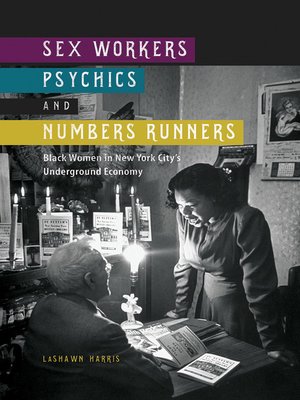Sex Workers, Psychics, and Numbers Runners
ebook ∣ Black Women in New York City's Underground Economy · New Black Studies
By LaShawn Harris

Sign up to save your library
With an OverDrive account, you can save your favorite libraries for at-a-glance information about availability. Find out more about OverDrive accounts.
Find this title in Libby, the library reading app by OverDrive.



Search for a digital library with this title
Title found at these libraries:
| Library Name | Distance |
|---|---|
| Loading... |
During the early twentieth century, a diverse group of African American women carved out unique niches for themselves within New York City's expansive informal economy. LaShawn Harris illuminates the labor patterns and economic activity of three perennials within this kaleidoscope of underground industry: sex work, numbers running for gambling enterprises, and the supernatural consulting business. Mining police and prison records, newspaper accounts, and period literature, Harris teases out answers to essential questions about these women and their working lives. She also offers a surprising revelation, arguing that the burgeoning underground economy served as a catalyst in working-class black women ™s creation of the employment opportunities, occupational identities, and survival strategies that provided them with financial stability and a sense of labor autonomy and mobility. At the same time, urban black women, all striving for economic and social prospects and pleasures, experienced the conspicuous and hidden dangers associated with newfound labor opportunities.|
Cover
Title
Contents
Acknowledgments
Introduction
1. Black Women, Urban Labor, and New York's Informal Economy
2. Madame Queen of Policy: Stephanie St. Clair, Harlem's Numbers Racket, and Community Advocacy
3. Black Women Supernatural Consultants, Numbers Gambling, and Public Outcries against Supernaturalism
4. "I Have My Own Room on 139th Street": Black Women and the Urban Sex Economy
5. "'Decent and God-Fearing Men and Women' Are Restricted to These Districts": Community Activism against Urban Vice and Informal Labor
Conclusion
Notes
Index
|
Darlene Clark Hine Award, Organization of American Historians (OAH), 2017
Philip Taft Labor Prize in Labor and Working-Class History, Labor and Working-Class History Association (LAWCHA) and the Cornell ILR School, 2017 — Organization of American Historians (OAH)
Darlene Clark Hine Award, Organization of American Historians (OAH), 2017
Philip Taft Labor Prize in Labor and Working-Class History, Labor and Working-Class History Association (LAWCHA) and the Cornell ILR School, 2017 — Labor and Working-Class History Association (LAWCHA) and the Cornell ILR School
|LaShawn Harris is an assistant professor of history at Michigan State University.
Philip Taft Labor Prize in Labor and Working-Class History, Labor and Working-Class History Association (LAWCHA) and the Cornell ILR School, 2017 — Organization of American Historians (OAH)
Darlene Clark Hine Award, Organization of American Historians (OAH), 2017
Philip Taft Labor Prize in Labor and Working-Class History, Labor and Working-Class History Association (LAWCHA) and the Cornell ILR School, 2017 — Labor and Working-Class History Association (LAWCHA) and the Cornell ILR School
|LaShawn Harris is an assistant professor of history at Michigan State University.







